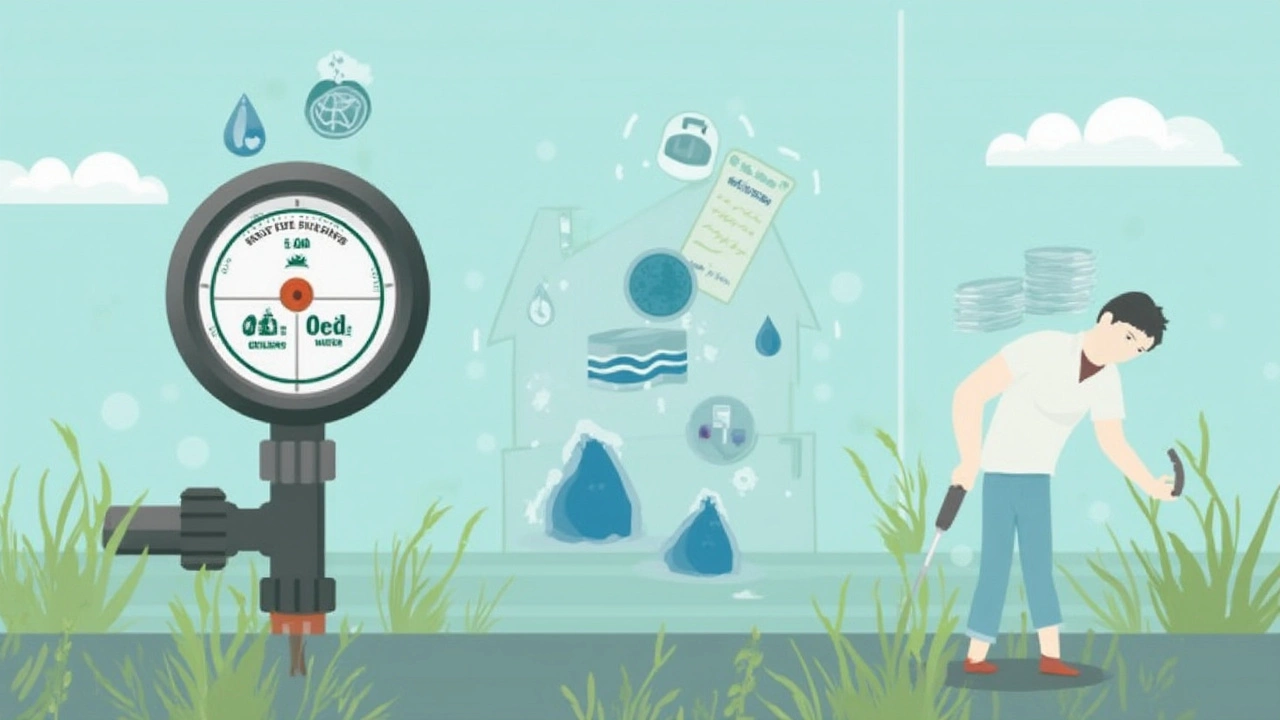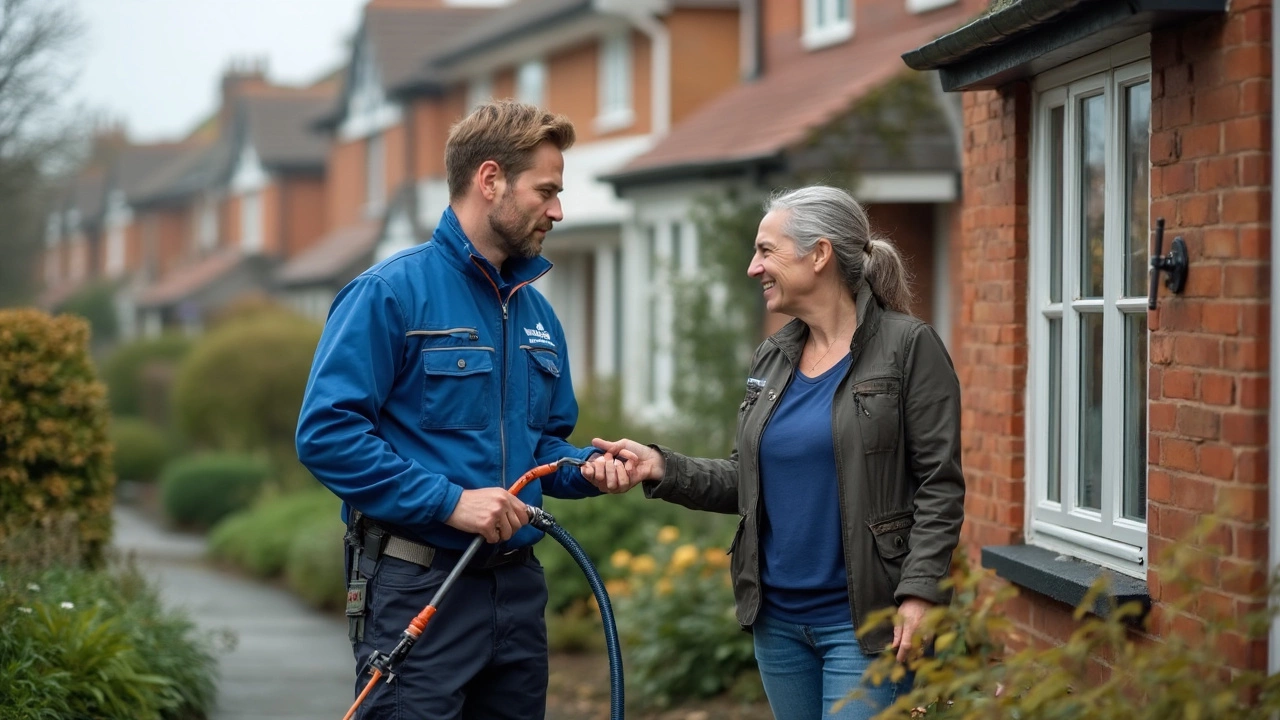Ever had a pressure washing crew roll up, hoses in hand, and wondered whether they’re about to tap into your water supply? You’re not alone. Most people picture those big machines and assume the pros bring giant tanks of water with them. Spoiler: that's rarely how it works.
In most cases, pressure washing companies hook their hoses right up to your outdoor faucet. They’re using your water, plain and simple. It’s way more practical for them since water is heavy, takes up a ton of space, and transporting it gets expensive fast. Most homes already have the flow and pressure needed for a good job, so it just makes sense for the company to use what’s already there.
- Where Does the Water Come From?
- How Much Water Does Pressure Washing Use?
- Who Pays for the Water?
- What to Ask Your Pressure Washer
Where Does the Water Come From?
Here’s the deal: most pressure washing jobs use the homeowner’s water. Pressure washing crews usually connect straight to your outdoor spigot. If you’re picturing a special water truck rolling up, that's not the norm for houses or even most storefronts.
The typical setup? The pressure washer brings a heavy-duty hose and connects it to your garden tap. The machine boosts your regular water pressure, so there’s enough power to tackle grime on siding, driveways, decks, and patios. This keeps things simple, lighter for the crew, and cheaper for you.
The only times you might see a company roll in with their own water tank is for sites where there’s no working tap—think new builds, empty lots, or remote cabins. Even then, this is more expensive since water is bulky to haul and loads the truck. In regular neighborhoods, your tap does the trick every time.
Check out this quick table for how most pressure washing jobs get their water:
| Job Type | Water Source |
|---|---|
| House Exterior | Customer's outdoor spigot |
| Driveway/Patio | Customer's outdoor spigot |
| Commercial Storefront | Business's water tap |
| New Construction or Remote Site | Contractor brings water tank |
Most pressure washers need about 2 to 5 gallons of water per minute. That adds up, but household plumbing can usually handle it just fine. If your water has low pressure or the tap is tricky, mention it when you book. The crew can always check things out and make sure your setup works with their gear. If not, they’ll let you know up front—no guessing games.
When you’re comparing companies, ask flat-out: “Are you going to use my water, or bring your own?” That way there aren’t any surprises the day they show up. Not every company is the same, but using the customer’s water is normal in the pressure washing world.
How Much Water Does Pressure Washing Use?
Let’s get straight to it: pressure washing isn't quite the water guzzler people expect. On average, a typical residential pressure washer uses about 2 to 4 gallons of water per minute (GPM). If you run the washer for an hour, that’s roughly 120 to 240 gallons—less than the average family uses in a day just for showers and dishes.
For bigger, more powerful machines—like the ones used for commercial jobs—water usage can go up to 8 GPM or more. But for most homes, you’re looking at the lower end.
| Pressure Washer Type | Gallons Per Minute (GPM) | Gallons Per Hour |
|---|---|---|
| Light-duty (home use) | 2.0 | 120 |
| Medium-duty (pro/residential) | 3.5 | 210 |
| Heavy-duty (commercial) | 8.0 | 480 |
What matters most is that pressure washing actually uses less water than you might think, especially compared to cleaning the same area with a garden hose. For example, a typical garden hose runs at about 10 GPM, which adds up quickly if you’re trying to tackle a driveway or a big patio without a pressure washer.
- If you’re doing a small patio, you might only use about 60-100 gallons for the whole job.
- An average driveway could take 200-300 gallons total.
- Larger jobs (like a whole house wash) can run 400 gallons or more, but that’s still not crazy for one-time work.
The takeaway? Pressure washing gets surfaces clean fast without wasting a ton of water. Unless you have a monster job or some unusual equipment involved, you'll notice the time savings more than a spike in your water bill.

Who Pays for the Water?
Here’s what catches a lot of folks off guard: when a pressure washing service uses your outdoor spigot, you’re paying for that water. The cost usually shows up on your regular utility bill. Pressure washing companies almost never pay for the water directly—they're using what you already get from your local supplier.
Don’t worry, the hit to your wallet isn’t huge. Most residential pressure washing jobs use way less water than you’d think. On average, a pressure washer uses about 2 to 5 gallons per minute. Compare that to the average garden hose, which runs about 10 gallons per minute. So, even a big job might use less water than a day of running sprinklers.
| Job Type | Estimated Water Used (gallons) | Approximate Cost* |
|---|---|---|
| Driveway (1,000 sq ft) | 150–250 | $1.00–$2.00 |
| House Siding (2,000 sq ft) | 200–300 | $1.50–$2.50 |
| Deck (400 sq ft) | 40–60 | $0.25–$0.50 |
*Based on a national average of $0.007/gallon. Your local rate may vary.
Some companies will mention this upfront, but don’t count on it. If you’re curious—just ask before the job starts. A good company won’t mind explaining how much water they’ll use and reassure you it’s not going to break the bank.
- Always check if the water cost is included in your quote (usually it’s not—because it’s minimal).
- If your outdoor faucet isn’t working or isn’t easy to access, let the crew know beforehand. That way nobody gets caught off guard on job day.
- If you’re on a well or have water restrictions, talk about alternatives before hiring anyone.
The bottom line? For most regular home jobs, the cost of water is almost always passed on to you—but it’s pocket change compared to everything else. If this is a dealbreaker, bring it up early and see if the company has any other options.
What to Ask Your Pressure Washer
If you’re about to hire someone for pressure washing, there are a few things you’ll want to clear up before they fire up their equipment. Don’t be shy about asking questions—most pros expect it, and it can save you a surprise on your water bill.
- Do you use my water?—Most companies use your outdoor spigot. It’s not rude to double-check. If they use your water, ask where they’ll connect and how much they need.
- How much water will you use?—Some folks are surprised by how much water pressure washing needs. A standard job for a driveway or siding can take hundreds of gallons. Asking gives you a heads up if you’re on a metered supply.
- What equipment do you use?—Larger machines can use more water. Some contractors use hot water units or higher flow rigs. It doesn’t hurt to find out the specs—they should be upfront.
- Is water included in the price?—Some companies include small fees for water, especially if they have to truck it in for rural jobs. Make sure you know what’s what on your quote.
- Will you need access inside?—Most of the time, outside access is enough, but every once in a while they’ll want to hook up someplace weird or need the breaker box. Easier to ask now than be caught off guard.
If you're worried about usage, here’s some average water data for common pressure washing jobs:
| Job Type | Average Water Used (gallons) |
|---|---|
| Driveway (2-Car) | 300–400 |
| Deck (500 sq ft) | 150–200 |
| House Siding (2000 sq ft) | 400–700 |
It pays to be specific. If you're on a tight water budget or your supply is weak, mention it up front. Pressure washing pros can often adjust the machine’s flow or bring water if needed, but only if you’re clear about your needs. Don’t just assume—they’ll appreciate the heads-up.
